
KINH TẾ VÀ XÃ HỘI
Volume 3, Issue 4 51
CUSTOMARY LAWS ON GENDER EQUALITY AND THEIR
APPLICATION IN GENDER EQUALITY EDUCATION IN
SCHOOLS IN HA GIANG PROVINCE1
Nguyen Thuy Van1 Chu Vu Bao Thu2
Phan Duc Nam3
1, 3Thanh Do University; 2Journal of Science, Technology and Development
Email: ntvan@thanhdouni.edu.vn1; baothu2911@gmai.com2; pdnam@thanhdouni.edu.vn3
Received: 12/12/2024; Reviewed: 16/12/2024; Revised: 19/12/2024; Accepted: 20/12/2024
DOI: https://doi.org/10.58902/tcnckhpt.v3i4.196
Abstract: Gender equality which is one of the fundamental human rights has become a global
issue., In ethnic minority areas, in addition to legal frameworks, the implementation of gender equality
is also influenced and shaped by customary laws. Each ethnic minority group has its own customary
laws, reflecting the unique identity and characteristics of that group. To promote progressive customary
practices and gradually eliminate outdated conventions, contributing significantly to the realization of
gender equality in the region, Ha Giang Province has, in recent years, incorporated customary laws
into the promotion of gender equality. The province has also gradually integrated positive elements of
customary laws into educational efforts to raise awareness about gender equality in schools. This
article identifies customary laws related to gender equality among ethnic minorities in Ha Giang
Province and, based on this foundation, analyzes the application of these customary laws in gender
equality education in schools across the province.
Keywords: Schools in Ha Giang Province; Gender equality education; Customary laws on
gender equality.
1. Introduction
Ha Giang, a mountainous border province, has
faced numerous challenges, with a poverty rate of
37,08% and a near-poverty rate of 12,87%. The
population comprises 87,7% ethnic minorities,
whose educational attainment remains uneven.
Additionally, the male-preference mindset is still
prevalent within local communities. Issues such as
child marriage, consanguineous marriage, and
some outdated practices persist.
In response, gender equality has received
consistent attention from the province’s
leadership, governments at all levels, and
collaboration from relevant sectors in various
fields. The Provincial People’s Committee has
emphasized incorporating gender perspectives
into legal documents and socio-economic
development plans. Consequently, ethnic
minorities in Ha Giang have gradually developed
a more positive perception of gender equality.
1 The article is the result of the provincial-level research project “The Influence of Customary Laws on
Gender Equality in Ethnic Minority Areas of Ha Giang Province - Current Situation and Solutions”,
2022-2025.
Besides awareness campaigns to promote
gender equality among ethnic minorities, Ha
Giang has issued Resolution No. 27/2022/NQ-TU
of the Provincial Party Committee on eliminating
outdated customs among ethnic minorities to build
a modern lifestyle. This includes addressing the
negative aspects of customary laws that hinder
gender equality. Therefore, identifying gender-
related elements within customary laws among
ethnic groups, analyzing their roles, and engaging
the province's Education sector in promoting
gender equality through customary laws are
essential.
2. Research overview
To date, several studies have explored the
impact of customary laws on social life in general
and on gender equality in particular.
The research project “The Impact of
Customary Laws on Social Management in the
Thai and Hmong Ethnic Groups of Northwestern

KINH TẾ VÀ XÃ HỘI
52 JOURNAL OF SCIENTIFIC RESEARCH AND DEVELOPMENT
Vietnam”, featured in the proceedings of a
ministerial-level scientific project chaired by Bui
Xuan Truong at Ho Chi Minh National Academy
of Politics (Hanoi Campus) in 1997, includes the
article “Marriage and Family Laws of the Socialist
Republic of Vietnam and Their Implementation
Among the Thai and Hmong Ethnic Minorities.”
This work provided an overview of Vietnam's
Marriage and Family Laws and examined how
customary laws influence their implementation in
the northern mountainous provinces, specifically
in areas such as marriage, spousal responsibilities
and rights, and the duties of parents and children.
However, the article primarily highlighted
discrepancies between customary laws and the
current Marriage and Family Laws, without
delving into the positive aspects of customary laws
or the root causes of their effects.
In 2001, Tran Minh Hang noted in her study,
“Customs and Practices Affecting Reproductive
Health Care for Women of Ethnic Minorities in Ha
Giang Province,” that beliefs such as “many
children bring many blessings” and a strong
preference for male children posed significant
challenges for women in exercising their
reproductive rights and family planning. Many
women lacked autonomy in deciding the number
of children they had due to pressure from their
husbands or in-laws. The study revealed that
69,7% of Hmong women and 47,5% of Dao
women expressed a desire to have additional sons
if they already had daughters. Additionally, child
marriage was prevalent, and reproductive health
care remained a pressing issue: nearly two-thirds
of pregnant women did not receive prenatal care,
and 60,6% of births were attended only by family
members. These practices were identified as
barriers to achieving gender equality in family
labor among ethnic minority women in the
northern mountainous regions of Vietnam.
In her 2008 article “Social Factors Affecting
the Implementation of Gender Equality Laws,”
published in Law Journal, Bui Thi Mung analyzed
social factors, including customary laws, that
significantly influence the implementation of
gender equality laws in ethnic minority regions.
Nguyen Le Thu, in her 2012 article “Inferiority
and Complacency of Women and Gender
Inequality in H’mong Families in Ha Giang”
(published in Ethnicity and Era Journal) and her
2017 doctoral dissertation in philosophy, “Gender
Equality in Family Labor Among Ethnic
Minorities in Northern Vietnam Today,”
discussed the challenges to achieving gender
equality in family labor among ethnic minorities
in the northern mountainous areas. Her research
found that traditional gender stereotypes persist,
with labor divisions strictly adhering to the
concepts of "men’s work" and "women’s work,"
which diminish the value of women’s labor. These
norms restrict women’s access to and control over
resources for development, limit their decision-
making power, and hinder progress in achieving
gender equality in family labor.
In her 2020 monograph “Achieving Gender
Equality in Ethnic Minority Areas” (Social
Sciences Publishing House), Dang Thi Hoa
examined theoretical foundations and policies on
gender equality implementation in ethnic minority
areas, highlighting the impacts of customs and
practices on policy outcomes.
Nguyen Thi Ha’s 2012 doctoral dissertation
“Gender Relations in Ethnic Minority Families in
Northern Vietnam Today” analyzed the dynamics
between men and women across various aspects of
family life. Her study identified the current state
and evolving trends of gender relations within
ethnic minority families in the northern
mountainous regions.
Thus, while existing studies have explored the
relationship between customary laws and gender
equality, none have specifically focused on the
customary laws of ethnic minorities in Ha Giang,
their effects on gender equality, or their
integration into gender equality education in local
schools. This research aims to address these gaps.
3. Research Methods
This study employs the method of secondary
document analysis. It involves examining reports
on ethnic minority education, reports on the
influence of customary laws on gender equality
implementation in ethnic minority areas of Ha
Giang province, and reports on the application of
customary laws in gender equality education in
schools across Ha Giang. These reports are
sourced from district-level Departments of
Education and Training and the Ha Giang
Provincial Department of Education and Training.

KINH TẾ VÀ XÃ HỘI
Volume 3, Issue 4 53
Additionally, the study reviews local
documents on customs, customary laws, and
village-level conventions in ethnic minority areas
of Ha Giang province.
This method is implemented to:
1. Identify the customary laws being
practiced by various ethnic minority groups.
2. Compile and assess the application of
customary laws in promoting gender equality
education in schools throughout Ha Giang
province.
4. Research results
4.1 The identification of Customary Laws
Related to Gender Equality Among Ethnic
Minorities in Ha Giang Province
Ha Giang is home to a large population of
ethnic minorities, each with its own customs and
traditions related to gender equality.
Currently, forced or arranged marriages, often
orchestrated by parents, which have significantly
decreased across the province , still persist,
primarily within the Hmong and Nung
communities. Women are more frequently
subjected to forced marriages than men, with
limited freedom to choose their partners.
Survey results reveal that the traditional
Hmong practice of Keo vợ (Bride Kidnapping),
which originally held a deeply humanistic
meaning-emphasizing marital freedom and the
value of women- has, in some cases, been
distorted. These distortions have diminished its
original humanistic essence, leading to violations
of the Law on Marriage and Family, such as child
marriages and forced marriages.
Although the incidence of child marriage has
markedly declined in recent years, it still occurs.
A more concerning trend is the circumvention of
legal regulations and local conventions in
marriage. Some families have allowed young
couples to cohabit, with children taking the
mother's surname initially. When the couple
reaches the legal age, they officially register their
marriage and then change the children's surname
to the father’s. For instance, in the first half of
2021, Tung San commune in Hoang Su Phi district
reported three cases of child marriage and one case
of consanguineous marriage.Such practices
complicate the identification of personal records
as well as the registration of household
information for citizens.
Cases of consanguineous marriage, which
primarily occur within the Hmong, La Chi, and Co
Lao communities, is influenced by their
traditionally short genealogical lineage-three
generations for men and two for women. After
these timeframes, blood relations are no longer
recognized. As a result, consanguineous marriages
were historically complex and widespread within
the La Chi community. However, thanks to
interventions by authorities and local
organizations, this issue has significantly declined
in recent years.
In the Dao community, the practice of
demanding high bride prices and emphasizing the
role of shamans in numerous rituals-such as
escorting the bride, expelling misfortune,
determining compatibility, and conducting other
ceremonies remains common. These practices
often involve expensive offerings and high
payments to the shaman.
Funerals among the La Chi are also elaborate
and costly. Thirteen days after a person's death, a
soul-calling ceremony is held, requiring offerings
such as a pig weighing 50-100 kilograms, along
with chickens, goats, liquor, and other items. At
funerals, women eat separately from men. When a
man dies, three buffaloes are sacrificed, while for
a woman, only pigs are offered.
In daily life, certain ethnic groups continue to
exhibit male-preferential customs, valuing sons
over daughters. Among the Co Lao, girls are only
taught basic literacy and are not allowed to pursue
higher education. If a woman has only two
daughters, she is not permitted to sit at the main
table near the family altar. In some communities
(e.g., Co Lao and La Chi), visiting guests eat with
the men while women eat separately in the
kitchen. Additionally, among the Nùng, newly
married daughters-in-law who have not yet borne
children are prohibited from using chopsticks to
serve food to their fathers-in-law, elder brothers-
in-law, or other senior family members.
Overall, most ethnic minority women face
unequal treatment, lack a voice in family matters,
and have no decision-making authority within
their households.

KINH TẾ VÀ XÃ HỘI
54 JOURNAL OF SCIENTIFIC RESEARCH AND DEVELOPMENT
Many households of the Nung, Dao Ao Dai,
and La Chi ethnic groups continue the practice of
free-ranging livestock or keeping them under
stilted houses. Some families even build livestock
pens near the entrance to showcase their wealth to
neighbors and friends, often neglecting proper
hygiene in these areas. Particularly among the La
Chi, most households lack basic facilities like
toilets and bathing areas, negatively impacting the
lives and health of women, girls, and the
community as a whole.
Labor distribution is often inequitable, with
women bearing the burden of heavy labor,
including tasks traditionally assigned to men, such
as plowing and carrying firewood. Men, however,
do not participate in tasks considered women's
work. Furthermore, financial control and
household expenditures are typically managed by
men.
Superstitions related to housing architecture
are still prevalent. For example, a daughter-in-law
who has recently given birth (within one month)
must stay in a dark room, avoids bathing or
cleaning, refrains from walking past the altar,
cannot use the main entrance, and must follow a
restrictive diet. These practices are major
contributors to health issues, malnutrition in
children, and illnesses in mothers.
In funeral rituals and spiritual practices,
women are often considered impure and are barred
from participating in certain ceremonies, such as
forest worship, ancestral offerings held behind the
house, or spirit offerings in the kitchen (Nung
ethnic group). During rituals that involve drinking
wine from buffalo horns, women are not allowed
to participate (La Chi ethnic group). At funerals,
women eat separately from men. When a man
dies, three buffaloes are sacrificed, while for a
woman, only pigs are offered (La Chi ethnic
group).
In Marriage:
Girls often do not have the right to choose their
spouse. Upon marriage, they endure hard labor
and discrimination within their husband’s
household. When a girl becomes a daughter-in-
law, she is required to wake up early to handle all
household chores, including boiling hot water for
her in-laws to wash their faces in the morning and
their feet at night. She is not allowed to sit on a
chair and must squat in the presence of her father-
in-law, elder brother-in-law, or other senior family
members (Dao ethnic group). Girls are more
frequently subjected to forced marriages
compared to men and often cannot marry the
person they love. If the parents have already
accepted a bride price from someone, the girl must
repay an amount ranging from 20 to 30 million
VND to marry someone else.
Inequality in Roles and Power Between Men
and Women:
Certain customary laws create disparities in
roles and power between men and women. For
instance, inheritance rules often favor men,
leading to inequities and injustices within families
and society. Traditional customs may dictate
specific roles and responsibilities for men and
women, resulting in an imbalance in labor division
and workload. Women are often burdened with
heavier responsibilities in household tasks and
agricultural labor, while men are more likely to
engage in broader social and economic activities.
4.2. Incorporating Customary Laws into Gender
Equality Education in Schools in Ha Giang
Province
Currently, integrating content on gender and
gender equality, and leveraging the influence of
customary laws in gender equality education, has
been a key focus for schools in Ha Giang
Province.
The provincial education sector has integrated
the application of customary law influences into
teaching gender equality through subjects such as
Biology, Literature, History, Geography, Civic
Education, Physical Education, and Fine Arts.
This has also been achieved through
extracurricular activities, after-school programs,
and dramatized performances. Schools have
organized awareness and education sessions on
gender, gender equality, and gender-based
violence during Monday morning flag-raising
ceremonies, class meetings, Pioneer Youth Union
activities, and Ho Chi Minh Communist Youth
Union meetings. Additionally, clubs within
schools, such as cultural, art, and academic clubs,
have served as platforms to educate about gender
equality through thematic events and celebrations
of significant holidays throughout the year.
These efforts aim to enhance awareness and

KINH TẾ VÀ XÃ HỘI
Volume 3, Issue 4 55
responsibility among local authorities, students’
families, teachers, and students themselves
regarding "Gender Equality and the Prevention of
Domestic Violence Against Women and Girls."
The initiatives also equip girls with skills to
protect themselves from risks such as abuse.
Educational communication activities include
quiz shows like Ring the Golden Bell to explore
topics such as marriage and family law, children’s
rights, and the role and position of women in
society. Art competitions like drawing contests on
gender equality are also conducted. All
educational institutions in the province engage in
outreach efforts to provide knowledge about
gender, gender equality, and the prevention of
violence against women and girls, equipping
students with related knowledge and skills.
Awareness is raised through flag-raising
ceremonies, class activities, and team meetings,
focusing on gender knowledge, the history of the
Vietnam Women's Union, Vietnam Women's Day,
and International Women's Day (March 8).
Students also gain hands-on experience by
participating in role-playing scenarios, drawing
competitions, and visual storytelling about gender
equality. Moreover, efforts are made to correct and
educate students on speech, thoughts, attitudes,
and behaviors that display gender biases or
discrimination.
Through the implementation of propaganda
activities and the integration of content into
teaching that aims to eliminate outdated customs
among ethnic minorities in Ha Giang, based on
Resolution 27 of the Provincial Party Committee
(materials compiled by the Ha Giang Department
of Education and Training), and leveraging real-
life examples of local customary law impacts,
students are educated about gender equality.
Additionally, the Plan International project on
gender equality, particularly the Girls Ready for
the Future initiative, has provided training to
enhance the capacity of teachers and students,
equipping them with knowledge about gender
equality.
Each year, the Dong Van District Education
and Training Office, following directives from
higher authorities, specifies and directs schools to
implement programs that promote gender equality
and incorporate the positive aspects of customary
laws into gender equality education for students of
various ethnic groups. They also develop plans
and carry out activities related to the enforcement
of the Gender Equality Law, the Gender Equality
Action Month, and other initiatives, reaching
100% of school staff, teachers, and students. The
district education sector has widely disseminated
information to all staff, teachers, students, and
parents about the Gender Equality Law;
Government Decree No. 48/2009/ND-CP dated
May 19, 2009, which stipulates measures to ensure
gender equality; and Government Decree No.
55/2009/ND-CP dated June 10, 2009, which
prescribes penalties for administrative violations
regarding gender equality. These efforts aim to
gradually raise awareness about gender equality.
Moreover, significant attention is given to
promoting legal education and raising awareness
about gender equality in schools. Gender equality
education is integrated through various methods,
such as meetings, conferences, specialized
training sessions, mass media, cultural activities
within communities, thematic discussions, and the
involvement of communicators, collaborators, and
clubs. On special occasions such as March 8,
October 20, and November 20, the education
sector has organized discussions and thematic
events to promote gender equality and leverage the
positive aspects of customary laws in gender
equality education. These discussions have
reached 100% of school staff, teachers, and
students, spreading awareness about gender
equality, women’s and children’s rights, and
customary laws related to gender equality.
Additionally, campaigns such as the "Action
Month for Domestic Violence Prevention and
Control" and the "Action Month for Gender
Equality and Prevention of Gender-Based
Violence" have been implemented at educational
institutions. These campaigns have broadly
disseminated policies on social welfare, the
importance of empowering women and girls in
promoting gender equality, and legal policies on
gender equality, along with the prevention and
response to gender-based violence and the
protection of women and children. Activities have
included direct communication, initiatives within
the "Leaders of Change" clubs, and the movement
for "building friendly schools and active students."


![Cẩm nang Thanh niên hành động [Mới nhất]](https://cdn.tailieu.vn/images/document/thumbnail/2025/20251017/kimphuong1001/135x160/1521760665202.jpg)

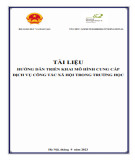
![Tài liệu học tập kỹ năng xã hội môn Kỹ năng học tập bậc đại học [mới nhất]](https://cdn.tailieu.vn/images/document/thumbnail/2025/20250414/trantrongkim2025/135x160/961744604716.jpg)
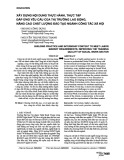
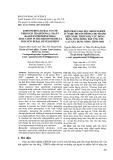
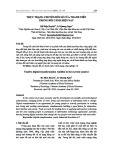
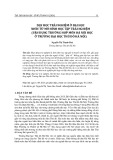














![Bài giảng Tín ngưỡng và Tôn giáo ở Việt Nam: Chương 6 - Trường ĐH Tân Trào [Mới Nhất]](https://cdn.tailieu.vn/images/document/thumbnail/2025/20250613/laphong0906/135x160/56461768291027.jpg)
![Bài giảng Tín ngưỡng và Tôn giáo ở Việt Nam: Chương 5 - Trường ĐH Tân Trào [Mới nhất]](https://cdn.tailieu.vn/images/document/thumbnail/2025/20250613/laphong0906/135x160/51251768291028.jpg)
